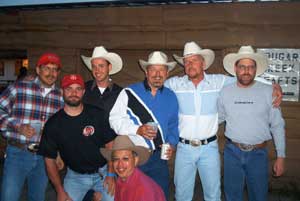Berkeleyan
Avoiding ‘the Berkeley shuffle’
Haas Scholarships provide talented undergrads with funding, mentor access, and total immersion in a research project
![]()
| 28 April 2004
| |  Berkeley undergrad Gregory Hughes (third from left, standing) corraled this gang of gay cowpokes from rural Washington state for his research study of their community. Hughes is one of 20 Haas Scholars who will present the results of their investigations at the Faculty Club this weekend. Photo courtesy Gregory Hughes |
While two of the 2003-2004 Haas Scholars studied gay cowboys and dengue infection in mice, another wrote a novel about an Egyptian-American family. They and the 17 other undergraduates in this year’s Haas Scholars cohort will present their work at the program’s annual two-day conference, “Fiat f(lux): Academics and Artists in Transition,” on Friday, April 30, and Saturday, May 1, in the Faculty Club’s Heyns Room.
Each year since 1998, thanks to the largesse of Berkeley alum Robert Haas and his wife, Colleen, 20 undergraduates have been able to immerse themselves in research or a creative project, receive up to $12,600 in funding, work with a faculty sponsor, and participate in an interdisciplinary community of fellow Haas Scholars and their mentors. Eligible undergraduates must be graduating in the following year, be entitled to need-based financial aid, and hold a Berkeley GPA of 3.5 or above.
“The Haas Scholars Program really gave me a chance to explore what research and grad school might be like if I choose to head down that path,” says Manasa Basavapatna, who is double majoring in molecular & cell biology and social welfare. Basavapatna worked in the lab of Eva Harris, an assistant professor of public health, where she has been engaged in ascertaining how interferons in mice respond to the dengue virus — information that may later be used to develop vaccines. Born in Bangalore, India, Basavapatna plans to pursue both a medical degree and a master’s in public health in order, she says, to “work to improve the public health infrastructure in developing countries, and also conduct research on infectious diseases that are rampant in the third world.”
“One of the greatest problems in academia today is specialization,” says Basavapatna. The challenge of explaining her research experience to the nonscientists in the Haas program proved instructive, she says, because it helped her articulate why she finds her work “important and fascinating.”
Gregory Hughes transferred to the University as a junior. He saw the Haas Scholars Program as way “to not get lost in the Berkeley shuffle” and to work one on one with a faculty member. As his research project the sociology major spent two months living among gay men in a rural area in eastern Washington state.
Hughes arrived in the area sporting typical urban youth attire. It wasn’t until he rode with a cadre from the community to a gay rodeo in Calgary and traded in his baggy pants for requisite cowboy wear — Wrangler jeans, a Western shirt, a cowboy hat — that he was accepted into the fold and found “people were willing to tell me more.”
The rural gay community, says Hughes, “is based on friendship networks and face-to-face meetings. In San Francisco, by contrast, the community is assumed just to be there, he says, but people don't necessarily know each other.
Hughes’ faculty sponsor, Dawne Moon, has questioned the existence of a single gay community. “She made me recognize my own assumptions about gay culture,” he says. “There’s no way I could have done this project without her.”
Zeina Halim also extends much credit to her mentor, Ishmael Reed, who she first met when she took his creative writing class at Berkeley. Reed, who encouraged Halim to expand a short story she had written for the class into a novel, offered to work with her individually. “I’m very indebted to him for helping me discover my life’s passion,” says the young writer who used her Haas funds to attend the Fine Arts Work Center at Provincetown, Mass., and the Squaw Valley Writers Conference.
Halim’s literary fiction project centers on three generations of an Egyptian-American family. In the novel she explores social issues such as cultural and gender conflict between old-world Egyptian-Muslim values and more modern Western values. She plans to submit her novel to her agent by September 1, and then begin work on a second book. Halim will be reading from her manuscript, A Scratched Lens, at the Haas Scholars conference at 7:15 p.m. on Friday evening.
“It’s been very inspiring and motivating to be part of this community where you share a common endeavor,” says Halim. “We all know about each other’s projects from the beginning,” she says, “like watching someone’s children grow and evolve.”
To learn about this weekend’s conference, visit research.berkeley.edu/haas_scholars/news/2003-2004/confprog.html

